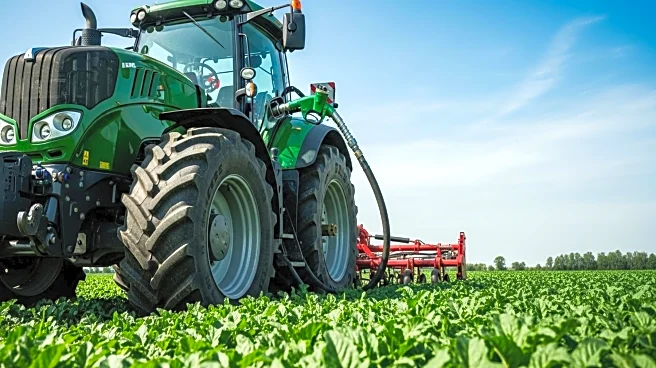What's Happening?
John Deere has announced that its Tier 4 diesel engines are now approved for B30 fuel blends, which contain up to 30% biodiesel. This development marks a significant step towards the adoption of renewable fuels, particularly benefiting Iowa, a leading producer of biodiesel. Previously, John Deere's engines were rated for B20 fuel blends, containing 20% biodiesel. The Iowa Renewable Fuels Association (IRFA) has praised John Deere for its leadership in promoting renewable fuels. Pierre Guyot, Senior Vice President of John Deere Power Systems, emphasized the company's commitment to renewable fuels, highlighting the opportunity for farmers to use higher biodiesel blends in their equipment. Iowa's biodiesel industry produced an estimated 350 million gallons in 2024, contributing $2.2 billion to the economy.
Why It's Important?
The approval of higher biodiesel blends in John Deere's tractors is crucial for the renewable energy sector, particularly in Iowa, which offers incentives for biodiesel use. This move supports the agriculture economy by allowing farmers to utilize fuels made from crops they grow. The initiative aligns with environmental goals to reduce emissions, as biodiesel is a cleaner alternative to traditional diesel. The economic impact is significant, with Iowa's biodiesel industry contributing billions to the state's economy. The adoption of B30 fuels could further enhance Iowa's leadership in renewable energy, making biodiesel more accessible and affordable for farmers.
What's Next?
Iowa farmers and fuel retailers are likely to benefit from state and IRFA incentives for using higher biodiesel blends. These programs offer tax credits and fuel credits, making biodiesel more economically viable. As John Deere continues to promote renewable fuels, other states may follow Iowa's example, potentially leading to broader adoption of biodiesel across the U.S. The agricultural sector may see increased demand for biodiesel-compatible equipment, driving further innovation in renewable fuel technologies.
Beyond the Headlines
The expansion of biodiesel use in agricultural machinery could have long-term environmental benefits, reducing reliance on fossil fuels and lowering greenhouse gas emissions. This shift may also influence cultural perceptions of renewable energy, encouraging more sustainable farming practices. As biodiesel becomes more mainstream, it could pave the way for other renewable energy sources to gain traction in the agricultural industry.









